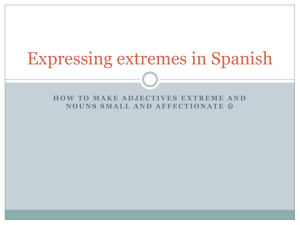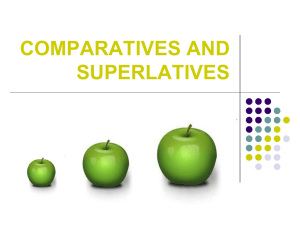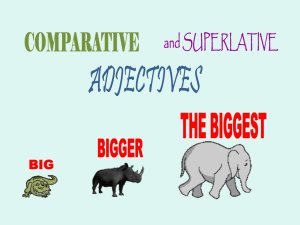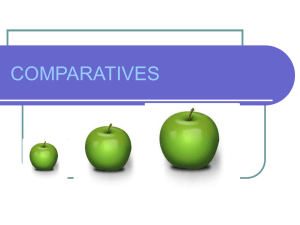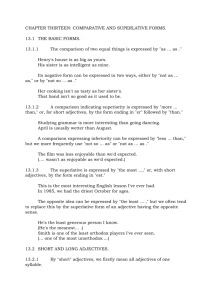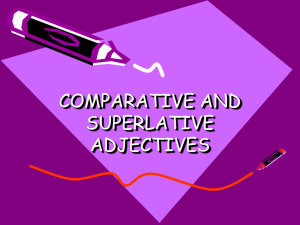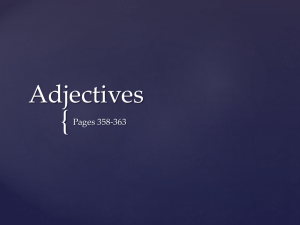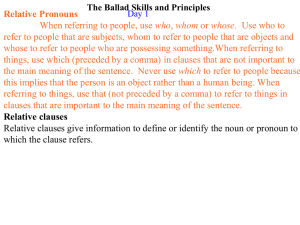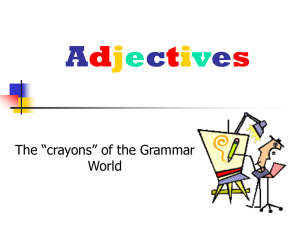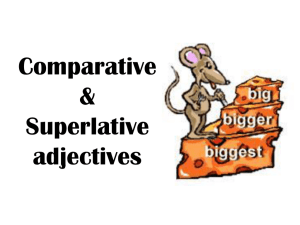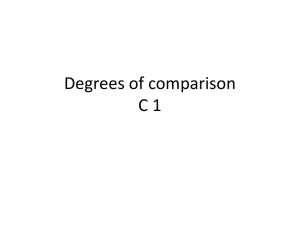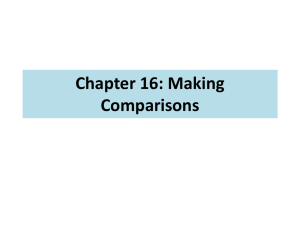Adjective Comparison: Comparative & Superlative Forms
advertisement
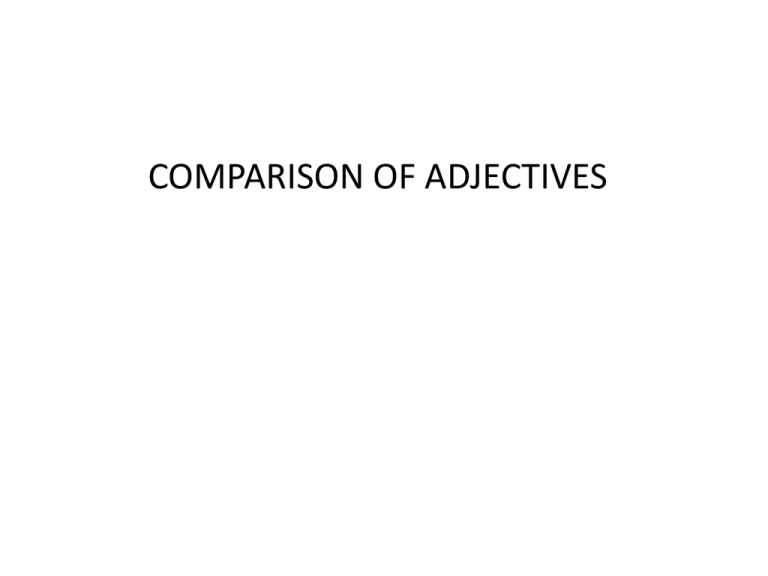
COMPARISON OF ADJECTIVES
COMPARISON OF ADJECTIVES
We form the comparative and superlative of short adjectives (e.g. low)
and long adjectives (e.g. expensive) in different ways.
COMPARATIVE
Short word: low:
Long word: expensive:
lower
more expensive
SUPERLATIVE
(the) lowest
(the) most expensive
COMPARISON OF ADJECTIVES
Short adjectives
One-syllable adjectives (e.g. small, nice) usually have the (e)r, (e)st ending.
Your hi-fi is smaller.
Emma needs a bigger computer.
This is the nicest colour.
Long adjectives
We also use more, most with three-syllable adjectives (e.g. ex-cit-ing) and
with longer ones.
The film was more exciting than the book.
We did the most interesting project.
This machine is the most reliable.
TWO-SYLLABLE ADJECTIVES
Some two-syllable adjectives have er, est, and some have more, most:
a) Words ending in y usually add er, est:
happy – happier – happiest.
(busy, dirty, easy, funny, happy, lovely, lucky, pretty, tidy...)
b) Words ending in er, le, ly add er, est:
clever – cleverer – cleverest
early – earlier – earliest
but eager, proper....
silly – sillier - silliest
noble –nobler – noblest
The following words have more, most:
a) Words ending in ful or less, e.g. careful, helpful; careless, hopeless
b) Words ending in ing or ed, e.g. boring, willing; damaged,
surprised, freezing...
c) Words ending in ard, al, ous, some, ent... e.g. awkward, crucial,
gorgeous, loathsome, spacious..
TWO-SYLLABLE ADJECTIVES
Some words have er, est or more, most:
narrow
{
narrower - narrowest
more narrow - most narrow
Examples are:
clever, common, cruel, gentle, narrow, pleasant, polite, quiet, simple, stupid,
tired...
The comparative and than
We often use a phrase with than after a comparative.
This restaurant is nicer than the Pizza House.
I had a bigger meal than you.
The steak is more expensive than the fish.
than me/than I am
Compare than me and than I am. Both are correct, and they have the same
meaning.
You're twenty years older than me.
You're twenty years older than I am.
Harriet's husband isn't as tall as her.
Her husband isn't as tall as she is.
The superlative
We normally use the before a superlative.
The quickest way is along this path.
The last question is the most difficult.
Note the pattern with one of:
Michael Jackson is one of the most famous pop singers ever.
Spelling of the adjectives using the endings er/est
positive
comparative superlative
large
larger
largest
leave out the silent e
big
bigger
biggest
sad
sadder
saddest
Double the consonant after
short vowel
dirty
dirtier
dirtiest
Change y to i (consonant
before y)
shy
shyer
shyest
y is not changed to i.
(although consonant before -y)
IRREGULAR COMPARISON
positive
comparative
superlative
good
better
best
bad / ill
worse
worst
little (amout)
less
least
little (size)
much / many
far (place + time)
smaller
more
further
smallest
most
furthest
far (place)
farther
farthest
late (time)
later
latest
late (order)
latter
last
old (people and things)
older
oldest
old (people)
elder
eldest
EXCEPTIONS
Short adjectives
One-syllable adjectives (e.g. small, nice) usually have the (e)r, (e)st ending.
Your hi-fi is smaller.
Emma needs a bigger computer.
This is the nicest colour.
but:
a) I am getting more and more tired.
b) I feel more dead than I did yesterday.
a) With adjectives that are also past participles, e.g. forced, lost, torn, burnt,
drunk, tired,...
b) With adjectives that are not gradeable, e.g. true, dead, male, royal, perfect...
EXCEPTIONS
* Comparison between two persons, items, etc:
He is the younger (of the two brothers)
* the + comparative.... the + comparative (double the + comparative)
the bigger the better
The more I swimm, the more energetic I feel.
* Doubly marked forms
He is the bestest friend i have ever had.
This way, it's more easier to see.
Comparison of equality
as... as
We use as ... as to say that things are equal or unequal.
Our house is as big as yours.
NOT It is so big as yours.
In a negative sentence we can also use so ... as, but this is less common than as ... as.
This flat isn't as big as/so big as our old one.
